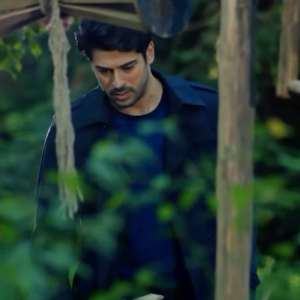In the electrifying confrontation captured in Endless Love, the fiery moments between Emir and Nihan transcend ordinary melodrama, becoming a haunting reflection of obsession, manipulation, and the unbreakable chains of family and power. From the very first scene, the atmosphere is thick with tension, where conversations meant to reassure instead reveal festering wounds beneath the surface. Emir, with his calculating eyes and deliberate tone, dismisses any notion that he could ever be threatened, while subtly reminding his father and everyone around him that he alone controls the narrative. His arrogance is not just a character trait but a weapon, one sharpened through years of learning how to bend loyalty into submission. Nihan, trapped in the role of dutiful sister and unwilling wife, is forced into an impossible balancing act, her heart suffocating under the weight of Emir’s demands and her soul yearning for the fleeting moments of truth and love that always seem just out of reach. What begins as a simple exchange of words spirals into an emotional inferno where every sentence becomes a dagger and every pause feels like the calm before a storm that refuses to end.
The drama intensifies as Emir’s toxic hold on Nihan’s family comes to the forefront, exposing the fragility of the alliances that bind them together. When the subject of Ozan arises, the conversation erupts like dry wood meeting flame; Emir treats Ozan not as a human being but as a pawn in his never-ending game of control. Nihan, her voice shaking yet defiant, reminds him that her brother is the only bridge left between them, the single thread stopping her from tearing away completely. Her warning carries the weight of desperation: if Emir’s cruelty ever harms Ozan, the fragile arrangement between them will shatter beyond repair. But Emir is not a man accustomed to surrender. Instead, he smirks at her pain, using Ozan’s vulnerability as leverage to keep her shackled to him. This grotesque manipulation is the very essence of Emir’s tyranny—where love is replaced by possession, and family becomes nothing more than a bargaining chip in his twisted version of loyalty. The audience is left breathless, torn between loathing Emir’s cruelty and marveling at the depth of psychological warfare he wages on the woman he calls his wife.
The emotional clash soon spills into outright confrontation when Kemal, the man who refuses to bow before Emir’s wealth and threats, steps into the fire. Their exchanges pulse with an energy that no amount of violence could match, for here words cut deeper than blades. “Stay away from my family,” Kemal demands, his voice filled with fury and desperation, while Emir mocks his passion with a chilling calmness that suggests he already knows how to twist the knife deeper. Every gesture between them carries the weight of years of rivalry, betrayal, and unresolved rage. Emir accuses, provokes, and ridicules, while Kemal stands his ground, a lion refusing to surrender even in the face of certain danger. When Emir threatens that Kemal lives in his shadow only because he allows it, the line crystallizes the heart of their feud: Emir sees himself as a god who grants permission for others to exist, while Kemal embodies resistance, a man whose love and integrity refuse to be bought or silenced. Their fiery standoff becomes the defining heartbeat of the episode, proof that their war is not only about Nihan but also about the right to define destiny itself.
Yet amid the chaos of threats and counter-threats, the personal battlefield between Emir and Nihan grows darker and more suffocating. Emir, obsessed with rewriting history, demands a renewal of their marriage with a grotesque insistence that she must wear his ring again, that she must love him because he wills it so. Nihan’s resistance, her sharp “never again,” is drowned beneath his chilling vow that she will never cross the threshold without his mark upon her finger. The symbolism of the second ring, the second wedding, the second beginning becomes a nightmare rather than a promise, for it represents Emir’s desire to erase her agency completely. What he calls love is revealed as domination, what he calls renewal is nothing less than entrapment. The walls close in on Nihan as he presses the ring onto her hand, not as a gesture of affection but as a chain that will bind her tighter. For the audience, it is both mesmerizing and horrifying—a portrait of a woman who cannot escape and a man whose love is indistinguishable from possession. Every beat of music, every flicker of light, underscores the tragedy of a love story that has turned into a cage, where every vow is a threat and every kiss is a weapon.
The episode crescendos in its final movements with revelations that stretch far beyond the personal, plunging into the world of power, corruption, and the cost of survival. As Kemal learns of the tragedies unfolding at Emir’s construction sites, where workers live in fear and families are shattered by negligence, the story pivots to a larger battlefield: justice versus exploitation. Emir’s empire, built on silence and fear, is confronted by Kemal’s unwillingness to ignore suffering, making their rivalry not just a private war over Nihan but a symbolic clash of values. Yet Emir, with his resources and influence, treats every obstacle as a minor inconvenience, boasting that no one has the strength to challenge his dominance. The juxtaposition of Kemal’s empathy with Emir’s arrogance creates a breathtaking tension that transcends romance and personal vendetta, turning their conflict into a moral saga. By the time the episode closes, with Emir’s vow that the war will not end until Kemal kneels before him, the audience is left with the chilling realization that this is not merely a love triangle but a battle for souls, identities, and futures. The fire between Emir and Nihan, with Kemal caught in its blaze, is not one that will burn out—it is a conflagration destined to consume everyone in its path.





